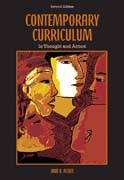
Teachers have relied on Curriculum to gain the practical skills to participate in the curriculum discussion and construct and implement curriculum in the classroom. The new seventh edition takes them even further, encouraging online curriculum conversation among users and two- way communication between the author and readers. Brief introductions to key curriculum persons and resources that are deviating from the established practice are presented in each chapter.New content has also been added on political ideologies, the conflicts over school subject matter, and data-driven decision making. Teachers will gain a new perspective on curriculum development. INDICE: Chapter 1 Humanistic Curriculum Characteristics of the Humanistic Curriculum Forms of Humanistic Curriculum Psychological Foundations of the Humanistic Curriculum Historical Antecedents to the Humanistic Curriculum Criticisms of the Humanistic Curriculum Concluding Comments Questions Suggested Strategic Research New Directions in the Humanistic Curriculum Chapter 2 The SocialReconstruction Curriculum Characteristics of the Social Reconstructionist Social Reconstruction in Practice Critical Pedagogy Psychological Foundations of Social Reconstruction Psychoanalytical Psychology and Social Reconstruction Historical Antecedents to Social Reconstruction Criticisms of Social Recontrustionism Concluding Comments Questions Suggested Strategic Research New Directions in Social Reconstruction Curriculum Chapter 3 The Systemic Curriculum Alignment Accountability Standards-Based Curriculum Psychological Foundations of theSystemic Curriculum Historical Antecedents to the Systemic Curriculum Consequences of Systemic Curriculum Concluding Comments Questions Suggested StrategicResearch New Directions in the Systemic Curriculum Chapter 4 The Academic Curriculum Approaches to the Academic Curriculum Psychological Foundations of theAcademic Curriculum Historical Antecedents of the Academic Curriculum Concluding Comments Questions Suggested Strategic Research New Directions in the Academic Curriculum Chapter 5 Deciding What Should Be Taught Arenas for Deciding What to Teach Contexts for Development of Curriculum Determining What to Teach Rational and Technical Models in Curriculum Decision Making Alternative Approaches to Determining Curriculum A Comment on Models and Approaches for Curriculum Building Concluding Comments Questions Suggested Strategic Research New Directions in Deciding What is to be Taught Chapter 6 Developing and Selecting Learning Opportunities Standards for Teaching Impact Classroom Curriculum Development Principles for Developing Learning Opportunities Learning Opportunities for Higher Order Thinking Procedures for Developing Learning Activities Criteria for Selecting Learning Activities Criticisms of Textbook and Learning Opportunities Criticisms of Criteria for Selecting Learning Opportunities Concluding Comments Questions Suggested Strategic Research Chapter 7 Organizing Learning Opportunities Key Concepts in Curriculum Organization Principles for Sequencing Centers and Activities Organizing Structures Empirical Studies of the Effects of Patterns Issues in Curriculum Organization Concluding Comments Questions Suggested Strategic Research New Directions in Organizing Learning Opportunities Chapter 8 Managing Curriculum Schools and the Institutionalized Curriculum Roles in Restructuring Curriculum Administrative Arrangements Trends in Reforming School Organization Options in the Schools Administration for Instructional Effectiveness Concluding Comments Questions Suggested Strategic Research New Directions in Schools as Institutions Chapter 9 Evaluating The Curriculum Models for Evaluation Controversial Technical Issues in Curriculum Evaluation Techniques for Collecting Data Concluding Comments Questions Suggested Strategic Research New Directions in Curriculum Evaluation Chapter 10 The Politics of Curriculum Making Curriculum Policy Concepts for Interpreting the Process of Political Decision Making Participants in Determining Curriculum Conflicts in Curriculum Control Concluding Comments Questions Suggested Strategic Research New Direction in the Politics of Curriculum Making Chapter 11 Current Issues Demanding Responses Curriculum for Thinking Curriculum Competition: An International Comparison Vocational Education Contrasting Purposes for Vocational Education Moral Education Character Education School Safety Concluding Comments Questions Suggested Strategic Research New Directions in Curriculum Issues Chapter 12 Trends In The Subject Fields Mathematics Science Physical and Health Education English Reading History and Social Studies Foreign Language The Arts Concluding Comments Questions Suggested Strategic Research New Directions in the Subject Matters Chapter 13 A Historical Perspective of Curriculum Making Curriculum Historians Founders of the Field of Curriculum Herbartism and the McMurrys Deweys Opposition to Herbartism Scientific Curriculum Making: Franklin Bobbitt and Werrett W. Charters Improvement of Instruction Rational Curriculum Making Feminine Enactment of Curriculum Concluding Comments Questions Suggested Strategic Research New Directions in Historical Curriculum Studies Chapter 14 The Promise of Theory and Inquiry in Curriculum State of the Field Trends in Curriculum Inquiry Inquiry in the School and Classroom Concluding Comments Questions Suggested Strategic Research New Directions in Curriculum Inquiry Index
- ISBN: 978-0-471-71943-4
- Editorial: John Wiley & Sons
- Encuadernacion: Rústica
- Páginas: 408
- Fecha Publicación: 16/01/2009
- Nº Volúmenes: 1
- Idioma: Inglés
